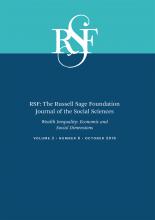Research Article
Open Access
Household Wealth Trends in the United States, 1962 to 2013: What Happened over the Great Recession?
Edward N. Wolff
RSF: The Russell Sage Foundation Journal of the Social Sciences October 2016, 2 (6) 24-43; DOI: https://doi.org/10.7758/RSF.2016.2.6.02
Edward N. Wolff
aProfessor of economics at New York University, research associate at the National Bureau of Economic Research, and editorial board member of the Journal of Economic Inequality and the Review of Income and Wealth

REFERENCES
- ↵Bureau of Labor Statistics (BLS). 2016. “Labor Force Statistics from the Current Population Survey.” Washington: U.S. Department of Labor. Accessed May 13, 2016. http://data.bls.gov/timeseries/LNS14000000.
- ↵Council of Economic Advisers. 2013. 2013 Economic Report of the President. Washington: Government Printing Office. Accessed May 13, 2016. https://www.whitehouse.gov/sites/default/files/docs/erp2013/full_2013_economic_report_of_the_president.pdf.
- ↵
- ↵Dow Jones. 2013. “S&P Composite 1500.” Accessed May 13, 2016. http://us.spindices.com/indices/equity/sp-composite-1500.
- ↵
- Kennickell, Arthur B., and
- R. Louise Woodburn
- ↵National Association of Realtors. 2012. “Median Sales Price of Existing Single-Family Homes for Metropolitan Areas.” Accessed May 13, 2016. http://www.realtor.org/sites/default/files/reports/2012/embargoes/2012-q1-metro-home-prices-49bc10b1efdc1b8cc3eb66dbcdad55f7/metro-home-prices-q1-single-family-2012-05-09.pdf.
- ↵National Bureau of Economic Research (NBER). 2010. “U.S. Business Cycle Expansions and Contractions.” Cambridge, Mass.: NBER. Accessed May 13, 2016. http://www.nber.org/cycles/cyclesmain.html.
- ↵
- ↵
- Saez, Emmanuel, and
- Gabriel Zucman
- Survey of Consumer Finances. Various years. Public use dataset distributed by the Board of Governors of the Federal Research System (downloaded 2015).
- Survey of Financial Characteristics of Consumers. Various years. Public use dataset distributed by the Board of Governors of the Federal Research System (downloaded 2015).
- ↵U.S. Census Bureau. 2008. Statistical Abstract of the United States: 2009, 128th ed. Washington: Government Printing Office. Accessed May 13, 2016. https://www.census.gov/library/publications/2008/compendia/statab/128ed.html.
- Wolff, Edward N. 1980. “Estimates of the 1969 Size Distribution of Household Wealth in the U.S from a Synthetic Data Base.” In Modeling the Distribution and Intergenerational Transmission of Wealth, edited by James D. Smith. Chicago: Chicago University Press.
- ↵
- ↵
- Wolff, Edward N
- ↵Wolff, Edward N. 2002. Top Heavy: A Study of Increasing Inequality of Wealth in America, updated and expanded edition. New York: The New Press.
- ↵Wolff, Edward N. 2011. “Recent Trends in Household Wealth in the U.S.: Rising Debt and the Middle Class Squeeze.” In Economics of Wealth in the 21st Century, edited by Jason M. Gonzales. Hauppauge, N.Y.: Nova Science Publishers.
- ↵Wolff, Edward N. 2015. Inheriting Wealth in America: Future Boom or Bust? New York: Oxford University Press.
In this issue
Household Wealth Trends in the United States, 1962 to 2013: What Happened over the Great Recession?
Edward N. Wolff
RSF: The Russell Sage Foundation Journal of the Social Sciences Oct 2016, 2 (6) 24-43; DOI: 10.7758/RSF.2016.2.6.02
Jump to section
Related Articles
- No related articles found.
Cited By...
- No citing articles found.





